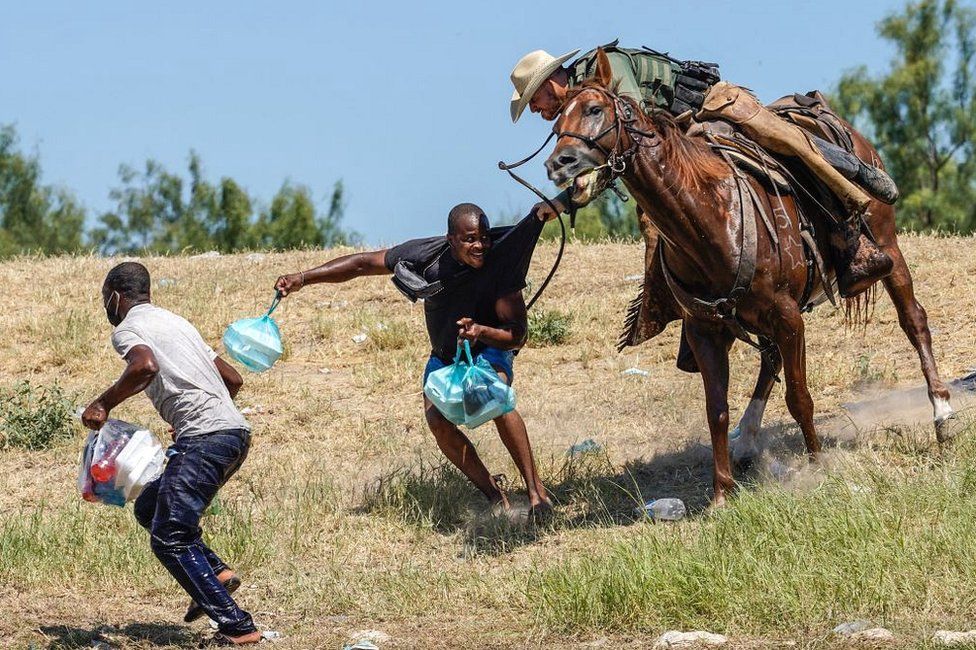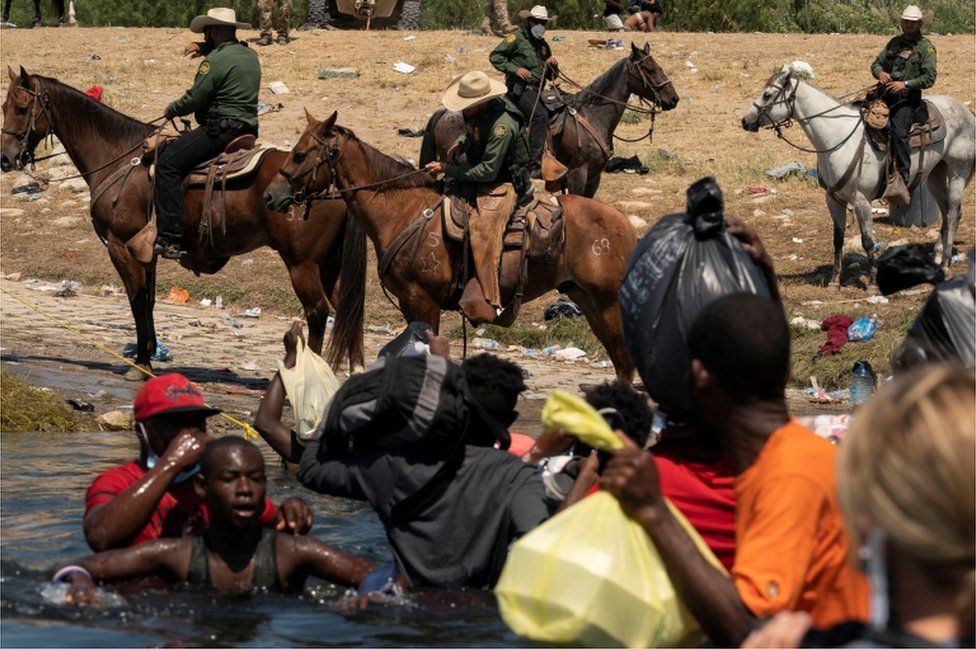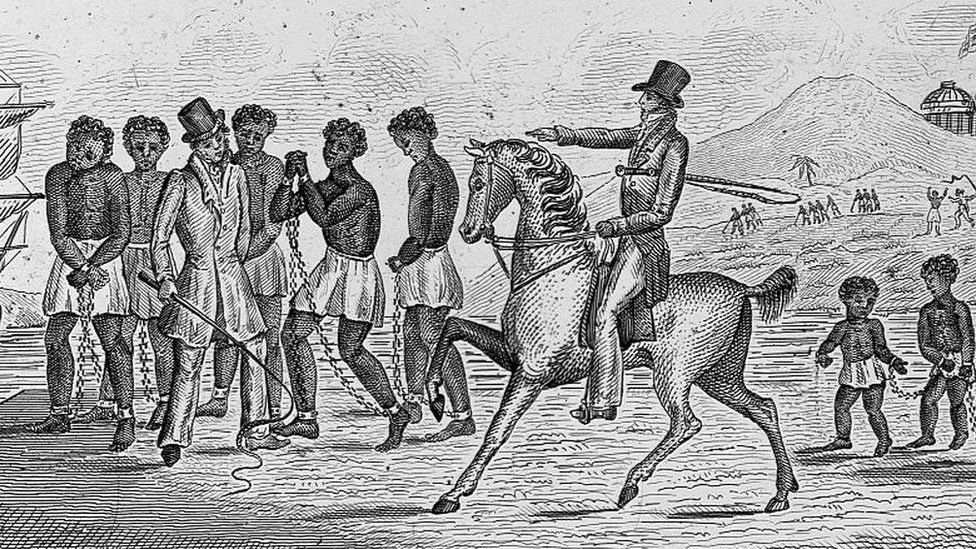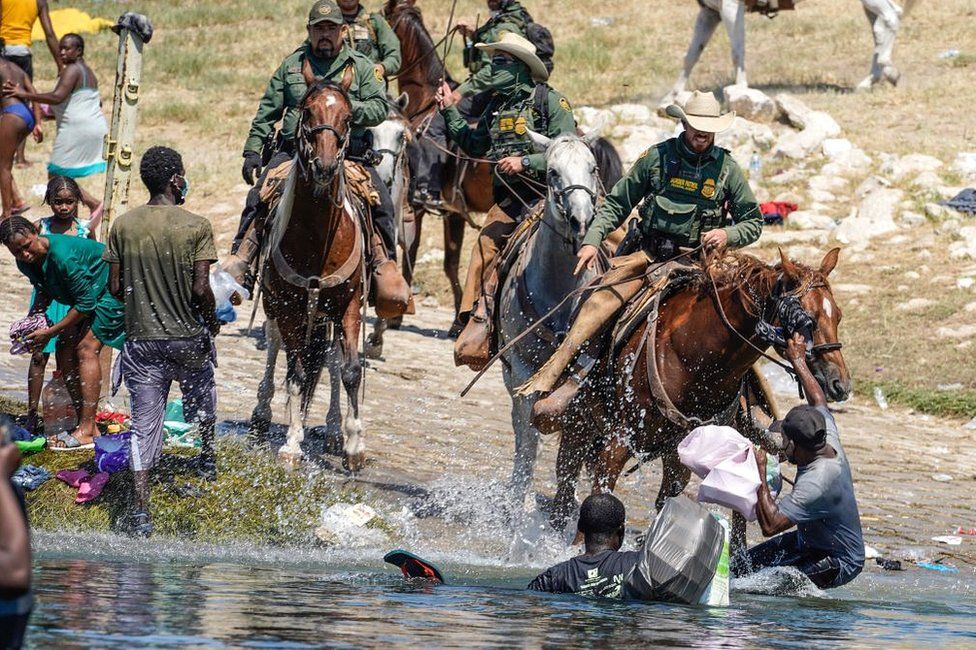
Shocking images of horse-mounted officers corralling Haitian migrants along the US-Mexico border are evoking dark comparisons to US slavery and the country's historical mistreatment of black people.
The widely shared images, taken by an AFP photographer earlier this week, appear to show US Border Patrol agents on horseback using their reins against Haitian migrants and pushing them back towards the Rio Grande river that divides Texas and Mexico.
Homeland Security Secretary Alejandro Mayorkas has said that the officers were trying to manage the migrants crossing the river. He has vowed that his department will investigate reports of alleged abuse.
Many Americans have likened the images to historical representations of slavery - which was abolished in 1865 - and other dark periods for black people in the US.
One widely shared image, for example, compares a recent picture from the US border with a historical drawing of an African slave being pulled with a rope and struck with a whip.
These images although centuries apart still seem to represent the worst of America’s capacity for humanity. @Potus if the plan is to #BuildBackBetter step 1 must be tearing down a foundation of oppressive practices. pic.twitter.com/bEkGDYl6Wg
— NAACP (@NAACP) September 21, 2021

"That's exactly what it is. It's horrible, and it's pure evil," Angela Byrd, an African-American resident of Washington DC, told BBC News. "It's very disheartening, because of the historical connections that we - whether it be Haitians, Cubans or African Americans - have with a man, on a horse, with a whip."
"It's a reminder of America's history, and how far we've come, but also of how far we still have to go," Ms Byrd added. "Clearly, some people are ready to change. Some people aren't."
Officials have disputed that the agents "whipped" the migrants. The National Fraternal Order of Police labour union, for example, noted that the officers are simply holding the reins used to manoeuvre the horses.
Among the prominent voices who have spoken out about the images is Derrick Johnson, the president and CEO of the National Association for the Advancement of Colored People (NAACP) - the nation's oldest civil rights group. On Monday, Mr Johnson met with administration officials and members of the Congressional Black Caucus to discuss the issue.

In a statement, Mr Johnson said that the events at the border are "all too familiar to those who are aware of America's ugly history".
Another observer, Bernice King - the daughter of famed civil rights leader Martin Luther King Jr - tweeted that the "United States treats people the way it wants to and that treatment has been heavily contingent on colour and class for hundreds of years."
Anne Bailey, a professor and the director of the Harriet Tubman Center for the Study of Freedom and Equity at Binghamton University, explained that while the images are "difficult regardless of the history", they are reminiscent of historical "slave patrols".
Sometimes referred to as "paddy rollers" in the pre-Civil War era, slave patrols were groups of armed men who policed and controlled the movement of slaves, or were used to track down those who had escaped from plantations in the US southern states.
They were supported by landowners and, in some places, the state itself.

"They were there to ensure that every person of colour stayed in their place, and stayed on their plantation," Ms Bailey said. "If somebody was found not on their plantation and on their way somewhere else, they often had to have a pass signed off on by their slave owner."
These patrols, Ms Bailey added, were often horse-mounted and equipped with whips.
"These slave patrols would enact their own kind of justice. They were supported by the state to do whatever they wanted to put their person back in their place, or just punish them with those whips," she said.

The recent images of officers on horseback corralling black people - particularly white men - comes as the US is in the "midst of a racial reckoning".
"It's who we were. But I don't think, and I hope, that it is not who we are," Ms Bailey added. "But [those images] bring back pictures of an ugly past, and we're still dealing with the legacy of that."
Mark Naison, a professor of history and African and African-American studies at Fordham University in New York, said that he believes the reaction to the images from the border are a natural result of growing public awareness of historical mistreatment of black people in the US.
"In the last 10 years, there has probably been more effective publicity about atrocities relating to racism in US history than there were in the previous 40 years," he said.

The historical images of slavery being shared on social media this week, Mr Naison added, are more accessible - and spread much more quickly - than other forms of media, such as TV shows or films in which African-American history is the focus.
Mr Naison added that the impact of these viral images, in turn, are often eye-opening for many Americans.
"History is alive. Images move like wildfire," he said. "Images of black people - not only during slavery, but after - being attacked and assaulted, are probably more visible now then they ever have been before."
Ms Byrd, for her part, said she believes the comparisons being made between the images from the border and America's past should serve as a reminder that Americans should learn their history.
"We have to continue to have those discussions, and we need to continue to talk about it," she said. "Not everyone wants to talk about slavery, but we have to continue to talk about it, to understand why this is wrong."
"image" - Google News
September 23, 2021 at 07:10AM
https://ift.tt/3u3Vu78
Grim echoes of history in images of Haitians at US-Mexico border - BBC News
"image" - Google News
https://ift.tt/3dgnNWk
https://ift.tt/2zaSFZM
Bagikan Berita Ini

















0 Response to "Grim echoes of history in images of Haitians at US-Mexico border - BBC News"
Post a Comment